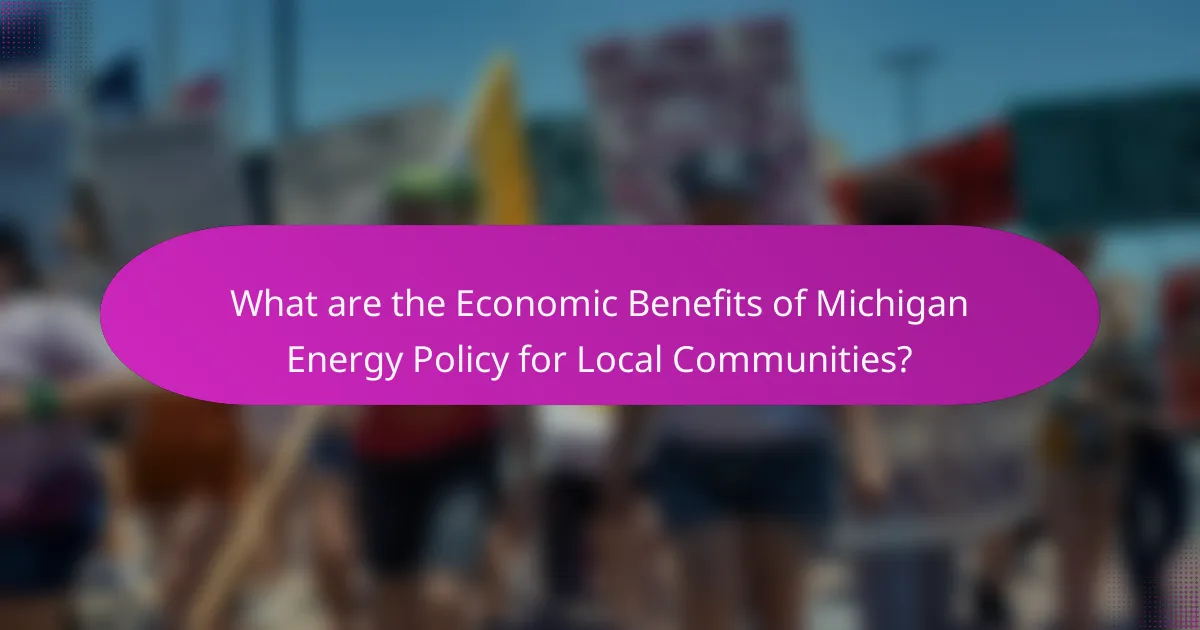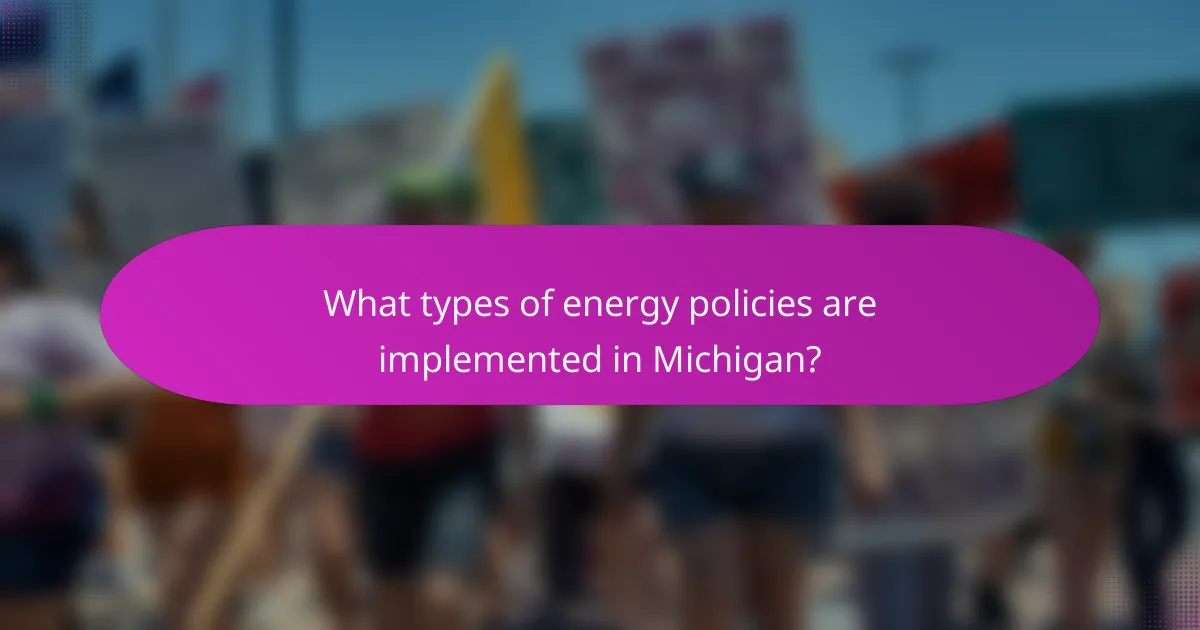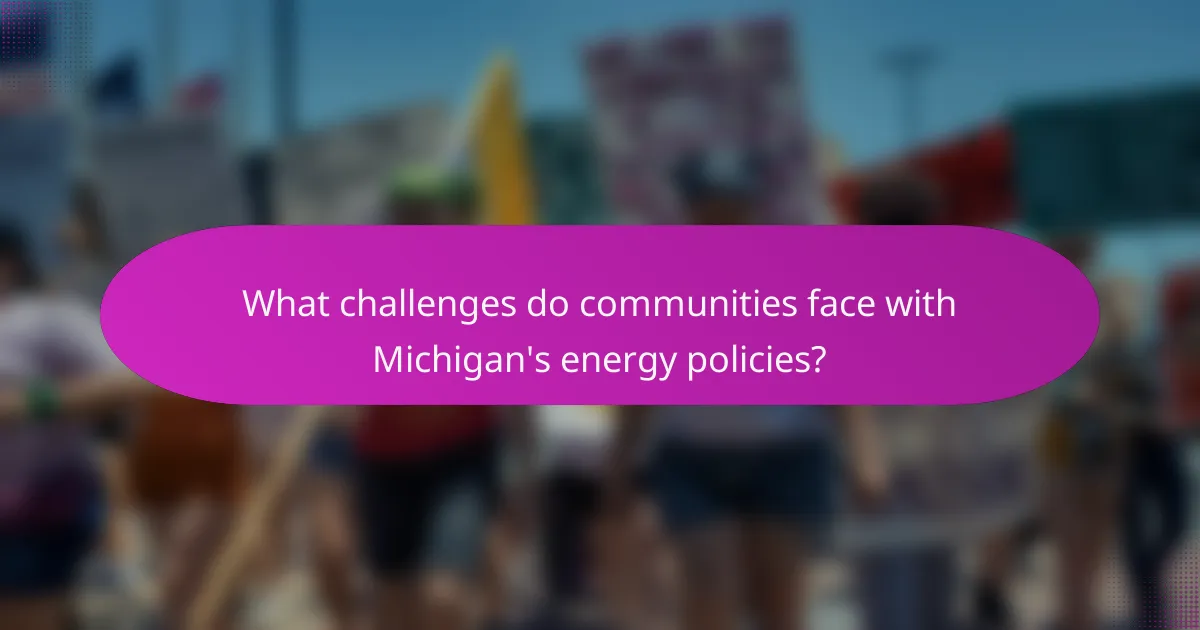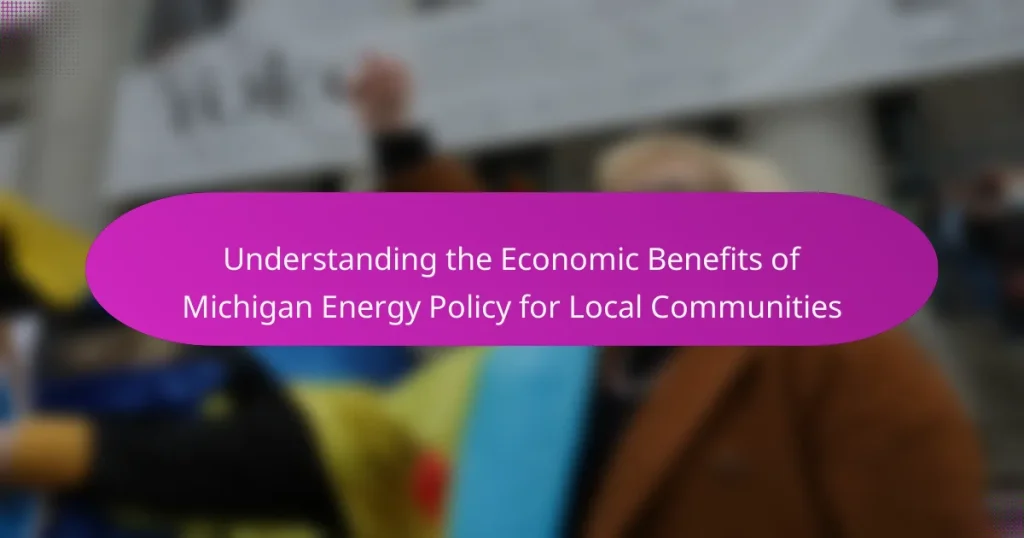
What are the Economic Benefits of Michigan Energy Policy for Local Communities?
The economic benefits of Michigan energy policy for local communities include job creation, reduced energy costs, and increased investment in renewable energy. Job creation occurs through the development of renewable energy projects, which employ local workers. According to the Michigan Energy Innovation Business Council, the clean energy sector has created over 100,000 jobs in the state. Reduced energy costs result from energy efficiency programs that lower utility bills for residents and businesses. These programs save consumers an average of $100 annually. Increased investment in renewable energy attracts businesses and stimulates local economies. In 2021, Michigan invested over $1 billion in renewable energy projects, enhancing community infrastructure.
How does Michigan’s energy policy impact local economies?
Michigan’s energy policy significantly impacts local economies by promoting renewable energy and energy efficiency. This policy fosters job creation in the clean energy sector. According to the Michigan Energy Innovation Business Council, the state has seen a 50% increase in renewable energy jobs since 2015. Local economies benefit from investments in solar and wind projects, which stimulate economic growth. Additionally, energy efficiency programs lower utility costs for residents and businesses. This results in increased disposable income, further boosting local spending. The transition to cleaner energy sources also enhances energy independence, reducing reliance on imported fuels. Overall, Michigan’s energy policy supports sustainable economic development in local communities.
What specific economic advantages do communities experience?
Communities experience various economic advantages from Michigan’s energy policy. These advantages include job creation, as local energy projects often require skilled labor. Increased investment in renewable energy leads to infrastructure development. This development can enhance local property values and attract new businesses. Additionally, communities benefit from lower energy costs due to energy efficiency programs. These programs can reduce the overall energy burden on residents and businesses. Tax incentives for renewable energy projects can further stimulate local economies. Moreover, community engagement in energy initiatives fosters social cohesion and local pride.
How does energy policy influence job creation in local areas?
Energy policy significantly influences job creation in local areas by promoting investments in renewable energy projects. Local governments often implement policies that incentivize the development of solar, wind, and other renewable energy sources. These investments lead to the establishment of new businesses and facilities, which require a workforce. For example, a report by the Michigan Energy Office states that the state’s renewable energy sector created over 10,000 jobs between 2010 and 2020. Furthermore, energy policies that support energy efficiency programs also generate employment opportunities in retrofitting and building maintenance. Overall, energy policy is a key driver in shaping local economies and job markets.
Why is local community engagement important in energy policy?
Local community engagement is crucial in energy policy because it fosters collaboration and trust. Engaged communities can provide valuable insights into local needs and preferences. This input helps policymakers design initiatives that are more effective and accepted. Moreover, community involvement leads to increased transparency in decision-making processes. When residents participate, they are more likely to support energy projects. This support can result in smoother implementation and reduced opposition. Studies show that energy projects with community backing often achieve better outcomes. Engaging local stakeholders also enhances the sustainability of energy solutions.
What role do local stakeholders play in energy policy development?
Local stakeholders play a crucial role in energy policy development. They provide essential insights that reflect community needs and preferences. Their involvement ensures that policies are socially acceptable and economically viable. Stakeholders include local governments, businesses, and residents. They contribute to public consultations and discussions, shaping policy frameworks. Research indicates that stakeholder engagement leads to more effective energy solutions. For example, the Michigan Energy Policy emphasizes local input to enhance community benefits. This collaborative approach fosters trust and promotes sustainable energy practices.
How can community feedback shape energy initiatives?
Community feedback can significantly shape energy initiatives by providing insights into local needs and preferences. Engaging with residents allows policymakers to identify specific energy concerns. For instance, feedback may reveal a demand for renewable energy sources or energy efficiency programs. This information can guide the development of tailored energy solutions. Additionally, community input can enhance public support for initiatives, increasing participation rates. Research shows that projects with community involvement often experience higher success rates. A study by the Michigan Public Service Commission found that energy programs aligned with community feedback led to a 30% increase in local adoption. Therefore, integrating community feedback is crucial for effective energy policy implementation.

What types of energy policies are implemented in Michigan?
Michigan implements several types of energy policies aimed at promoting sustainability and economic growth. These include renewable energy standards that require utilities to source a portion of their energy from renewable sources. The state also has energy efficiency programs designed to reduce energy consumption and lower costs for consumers. Additionally, Michigan promotes electric vehicle adoption through incentives and infrastructure development. The state has a focus on grid modernization to improve reliability and integrate renewable energy. Policies also encourage local energy generation and community solar projects. These initiatives are supported by the Michigan Public Service Commission, which oversees energy regulation in the state.
How do renewable energy policies affect local economies?
Renewable energy policies positively impact local economies by creating jobs and stimulating investment. These policies often lead to the development of renewable energy projects like wind and solar farms. Job creation in construction, maintenance, and operation of these facilities boosts local employment rates. According to the U.S. Department of Energy, renewable energy jobs have grown significantly, with over 3 million jobs in the sector reported in 2020.
Increased investment in renewable energy infrastructure can enhance local tax revenues. This additional revenue can be used for community services and improvements. For instance, Michigan’s renewable energy policies have led to a surge in investment, which supports local businesses and stimulates economic growth.
Moreover, renewable energy projects can lower energy costs for residents and businesses. This cost reduction can increase disposable income and spending in the local economy. Overall, renewable energy policies are essential in driving economic development at the local level.
What incentives are provided for adopting renewable energy sources?
Incentives for adopting renewable energy sources include tax credits, rebates, and grants. These financial incentives reduce the upfront costs for consumers and businesses. For example, the federal Investment Tax Credit allows a 26% tax credit for solar energy systems installed by 2022. Michigan also offers a Property Tax Exemption for renewable energy systems, which helps lower ongoing costs. Additionally, net metering policies allow users to receive credits for excess energy generated. These incentives encourage investment in renewable technologies. They contribute to job creation and economic growth in local communities.
How do these policies promote sustainable development?
These policies promote sustainable development by encouraging the use of renewable energy sources. They aim to reduce greenhouse gas emissions and enhance energy efficiency. By investing in clean energy, these policies support job creation in local communities. For example, Michigan’s energy policies have led to the growth of solar and wind industries. This transition not only lowers energy costs but also fosters economic resilience. Moreover, sustainable practices contribute to improved public health by reducing air pollution. Overall, these policies align economic growth with environmental stewardship.
What role does energy efficiency play in economic benefits?
Energy efficiency significantly contributes to economic benefits by reducing costs for consumers and businesses. It lowers energy bills, allowing households to allocate funds to other essential needs. Businesses experience decreased operational costs, enhancing their competitiveness. Improved energy efficiency can also lead to job creation in sectors like construction and manufacturing. According to the U.S. Department of Energy, energy efficiency investments can yield economic returns of up to $4 for every $1 spent. Additionally, energy-efficient practices can increase property values, attracting more investments in local communities. Overall, energy efficiency serves as a catalyst for sustainable economic growth.
What programs are available to improve energy efficiency in communities?
Programs available to improve energy efficiency in communities include the Energy Efficiency Program, the Community Energy Management Program, and the Michigan Saves program. The Energy Efficiency Program provides financial incentives for residential and commercial energy-saving upgrades. The Community Energy Management Program supports local governments in developing energy efficiency strategies. Michigan Saves offers low-interest loans for energy efficiency improvements. These programs aim to reduce energy consumption and lower utility costs for residents. They contribute to overall community sustainability and economic benefits. According to the Michigan Public Service Commission, these initiatives have resulted in significant energy savings across the state.
How do energy efficiency measures reduce costs for local businesses?
Energy efficiency measures reduce costs for local businesses by lowering energy consumption. These measures include upgrading to energy-efficient lighting, HVAC systems, and appliances. By implementing these upgrades, businesses can significantly decrease their utility bills. For instance, the U.S. Department of Energy states that energy-efficient upgrades can save businesses 10-50% on energy costs. Additionally, reduced energy use leads to lower demand charges from utility companies. This financial relief allows businesses to allocate funds to other operations. Overall, energy efficiency measures contribute to long-term savings and improved profitability for local businesses.

What challenges do communities face with Michigan’s energy policies?
Communities in Michigan face several challenges with the state’s energy policies. These challenges include high energy costs that strain local budgets. Many communities struggle to access renewable energy resources. There is also a lack of infrastructure to support energy efficiency initiatives. Additionally, regulatory complexities can hinder local energy projects. Some communities experience disparities in energy access and reliability. These issues can lead to economic disadvantages for affected areas. Overall, the challenges create barriers to achieving sustainable energy goals in Michigan.
How do regulatory hurdles impact local economic growth?
Regulatory hurdles negatively impact local economic growth by creating barriers for businesses. These barriers can include lengthy permitting processes and compliance costs. As a result, businesses may delay or forgo investments in the local economy. For example, a study by the National Bureau of Economic Research found that excessive regulations can reduce job creation by 2.5% annually. Additionally, local entrepreneurs may find it challenging to navigate complex regulatory environments. This complexity can discourage innovation and competition. Ultimately, regulatory hurdles can lead to slower economic development and reduced community investment.
What are common obstacles in implementing energy policies?
Common obstacles in implementing energy policies include political resistance, funding limitations, and technological challenges. Political resistance often arises from differing opinions among stakeholders. Funding limitations can hinder the development of necessary infrastructure. Technological challenges may arise from the integration of new energy systems. Additionally, regulatory hurdles can complicate the implementation process. Public opposition can also impede progress. Coordination among various agencies is often lacking. Lastly, insufficient data can affect decision-making and policy effectiveness.
How can communities overcome these challenges?
Communities can overcome challenges by actively engaging in local energy initiatives. Collaboration with state agencies can help secure funding and resources. Forming partnerships with local businesses can stimulate economic growth. Educating residents on energy efficiency can reduce costs and increase participation. Implementing renewable energy projects can create jobs and enhance sustainability. Utilizing state incentives can lower financial barriers for energy investments. Regular community meetings can foster open dialogue and address concerns. Tracking progress and sharing success stories can motivate ongoing involvement.
What strategies can communities adopt to maximize economic benefits?
Communities can adopt several strategies to maximize economic benefits. One effective strategy is to promote local renewable energy initiatives. This can lead to job creation in the green energy sector. For example, Michigan has seen growth in solar and wind industries, which has provided employment opportunities.
Another strategy is to invest in energy efficiency programs. These programs can reduce overall energy costs for residents and businesses. According to the Michigan Public Service Commission, energy efficiency can save consumers millions annually.
Additionally, communities can engage in public-private partnerships. These collaborations can attract investment and enhance infrastructure. This approach has been successful in various Michigan cities, leading to improved local economies.
Lastly, fostering community education about energy policies can empower residents. Informed communities are better equipped to advocate for beneficial policies. This can lead to increased participation in local energy programs, further enhancing economic benefits.
What best practices exist for community engagement in energy policy?
Best practices for community engagement in energy policy include fostering transparency, building trust, and encouraging participation. Transparency involves openly sharing information about energy policies and their impacts. Trust can be built through consistent communication and involving community leaders. Encouraging participation means creating accessible forums for residents to voice their opinions. It is essential to actively listen to community feedback and incorporate it into policy decisions. Research shows that inclusive engagement leads to more effective energy policies. The National Renewable Energy Laboratory emphasizes that communities engaged in the planning process are more likely to support and adopt energy initiatives.
How can local governments leverage energy policies for economic development?
Local governments can leverage energy policies for economic development by promoting renewable energy initiatives. These initiatives can attract investments and create jobs in the green energy sector. For example, Michigan’s commitment to renewable energy has led to a significant increase in clean energy jobs, which grew by 25% from 2017 to 2019.
Additionally, implementing energy efficiency programs can reduce operational costs for local businesses. This cost reduction can stimulate economic growth by allowing businesses to reinvest savings into expansion.
Local governments can also incentivize clean energy projects through grants and tax credits. Such incentives encourage businesses to adopt sustainable practices, enhancing their competitiveness.
Moreover, community engagement in energy policy development fosters local support and participation. This involvement can lead to innovative solutions tailored to community needs, driving further economic benefits.
Overall, by strategically utilizing energy policies, local governments can create a robust framework for sustainable economic development.
What resources are available for communities to understand and implement energy policies?
Communities can access various resources to understand and implement energy policies. These resources include government websites that provide guidelines and frameworks. The U.S. Department of Energy offers comprehensive information on energy efficiency and renewable energy. Local government offices often have dedicated personnel to assist with energy policy questions. Nonprofit organizations, such as the American Council for an Energy-Efficient Economy, provide research and best practices. Educational institutions also offer workshops and training on energy policy. Online platforms host webinars and forums for community engagement. Reports from think tanks can provide data-driven insights into local energy policies. These resources collectively empower communities to make informed decisions regarding energy policies.
The main entity of the article is Michigan’s energy policy and its economic benefits for local communities. The article outlines how this policy promotes job creation, reduces energy costs, and increases investment in renewable energy, leading to sustainable economic development. It discusses the impact of energy efficiency programs, the role of community engagement, and the importance of local stakeholder involvement in shaping effective energy initiatives. Additionally, the article examines the challenges communities face with energy policies and offers strategies to maximize economic benefits through public-private partnerships and education.


